Summary 
The Scottish tragedy in an effective outdoor production, traditionally costumed and staged, enhanced by spasmodic hag witches tempting a young and wholesome Macbeth and Lady. The dramatic shock and awe at temptation, rather than rising into melodramatic horror, subsides a bit with the descent into damnation, however, and slips further in a by-the-book evocation of the freefall into madness and mayhem. Still, handsomely mounted tragedy with resonant moments, especially in early scenes.
Design
Directed by Joseph Hanreddy. Set by Troy Hemmerling. Costumes by Bill Black. Lights by Donna Ruzika. Compositions and sound by Lindsay Jones. Fights by T. Anthony Marotta.
Cast
Lillian Castillo (Weyward Sister), Monica Lopez (Weyward Sister), Chelsea Steverson (Weyward Sister), Quinn Mattfeld (Malcolm), Grant Goodman (Macbeth), Kymberly Mellen (Lady Macbeth), Don Burroughs (Banquo), Michael Brusasco (Macduff), Caroline Cocker (Lady Macduff), Tony Amendola (Porter).
Analysis
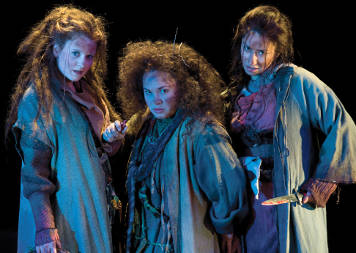
Joseph Hanreddy's Macbeth, its final preview staged outdoors at the Utah Shakespearean Festival's Adams Theatre, begins with soulful strings punctuated with ominous chords as smoke drifts from stage traps. Sparse branches from scarlet-lit trees are visible at stage left, and as 1.1 cannons boom, horns blare and metal clashes against armor, three haggard witches race onstage. They chant while in creepy tremors like epileptic fits, convulsing and intoning with rolling gray-haired heads and trembling old hands, then shouting "Macbeth!" in time to a booming cannon shot. The witches scatter as Duncan and eight of his soldiers arrive 1.2, but creep back down a stage right staircase, one wielding a knife menacingly in each hand, another skulking with an evil laugh, the third spitting on a bloody blade to clean it. After the bearded and grave Duncan, crowned and wearing a white robe with black gloves, hears of Macbeth's battlefield heroics, the soldiers exit and the witches again convulse, and to rhythmic drumming they chant, "Macbeth doth come." Grant Goodman's grim-visaged Macbeth, clad all in black, seems mesmerized by the thorny wooden crown the witches offer him, and they gasp and moan in grotesque erotic pleasure as he takes it from their gnarled hands.
Hanreddy's warrior thanes, wearing traditional medieval battle gear of leather, chain and wool, re-emerge to cheer Banquo and Goodman's Macbeth to the sound of pounding drums. Goodman's Macbeth - tall, blond, and handsome - seems intrigued by the prophesies - "this cannot be all?" - after Duncan, to a tolling bell, places the big pendant of the Thane of Cawdor around Macbeth's neck. Hanreddy roots the celebration in realism, showing the soldiers singing a song and chanting in Latin as a priest blesses the kneeling Duncan. When Malcolm is named successor, Goodman's Macbeth leads the applause but stomps downstage to seethe, then turns to glare at the heir apparent. When he turns to the audience, ominous bells toll, and his murderous admissions end in a blackout.
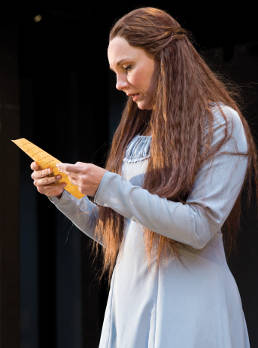
Hanreddy establishes the grisly moods of Macbeth with precision, segueing quickly into 1.5 as Kymberly Mellen's thrilled Lady - "stars, hide your fires" - reads his letter aloud while Macbeth emerges into the balcony above her. Mellen's Lady, amoral and ambitious and already slightly unhinged, kneels to the sound of croaking ravens - "unsex me here!" - and is bathed in purple light as Goodman's Macbeth descends and knee slides to her. They kneel face to face and share a passionate kiss, and she giggles in excitement as he tears off his coat - seeming aroused by the notion of regicide - but Macbeth recoils at the mention of murdering Duncan. Hanreddy then presents the Macbeth victims in an eerie progression during the 1.6 festivity, with the long-haired Macduff surrounded by his pretty pregnant Lady and three boisterous children, Banquo with his hand proudly upon Fleance's shoulder, and to the sounds of chirping birds Duncan arrives, resplendent in robes and golden crown. When Mellen's Lady takes Duncan's crown, she places it slowly within a box for safekeeping, and her goose-bump thrill is quite macabre, considering her intentions.
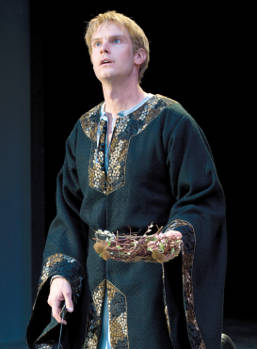
Goodman's wholesome-looking Macbeth does well in moments of shock and awe at the prospect of killing the King. In 1.7, he bursts from upstage, staggering toward the audience then graphically vomiting at his feet - "'tis best 't were done quickly" - in trepidation. In 2.1 he imitates an undead zombie to playfully menace the young Fleance, then kneels in fascinated horror with the fake crown - "is this a dagger that I see before me?" - given to him by the witches. His fatal-vision decision comes with owl shrieks and crow caws reverberating with other wild animal noises, and after the 2.2 deed, he lurches back onstage and collapses, clawing at his face with bloody hands, panicky and wild-eyed. When ordered by the Lady to return the knives to the murder scene - "infirm of purpose!" - he raises the blades threateningly at her to a shrieking horror movie sound effect. Goodman's distressed Macbeth then tries to obey, but falters halfway up the stairs - "Macbeth doth murder sleep" - and cannot continue.
Mellen matches the early dramatics of Goodman's Macbeth, her volatile Lady - wearing the medallion chain from the Thane of Cawdor around her neck - alternating between shrill anger and smothering attention. When he wavers, she shoves him three times in the chest and rails at him until he must embrace her to stop the violence and silence her, and during 2.2 when he is rattled by the pounding at the gate - "every noise appalls me" - she assures him as if he is a child then kneels with him at the railing along the edge of the stage to pantomime washing in water. Hanreddy follows with the 2.3 Porter sequence, as Tony Amendola's belching servant pretends to urinate in a chamber pot, then points out an "equivocator" in the audience before threatening to empty the bucket into the crowd. He carries a wooden walking stick, and after letting Macduff into Dunsinane, Amendola's Porter remains onstage to observe, eventually evolving into the more malevolent Seyton. Goodman's Macbeth re-appears in a nightshirt with a crucifix around his neck, and when he leads Macduff up the staircase to Duncan's quarters, he hesitates with a droll, "'t was a rough night," and finds he cannot continue.
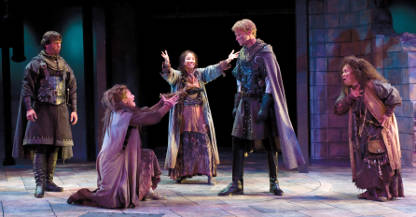
With the 3.1 crowning of the black-clad Macbeths to ceremonial music, the thanes all posed around the stage perimeter - Banquo: "thou has it now" - the Macbeths' temptation begins to descend into palpable damnation. Goodman and Mellen, while still quite good, are not quite as unconvincing as they were in depicting the excitement of evil possibilities. When Seyton brings him murderers, Goodman's petulant Macbeth hurls down the crown - "to be thus is nothing" - and jerks with fear when the Lady touches him: "full of scorpions is my mind, dear wife." Before the 3.4 banquet, Goodman's Macbeth paces in distracted circles, then to dramatic music points in horror at an empty place setting, the ghost evidenced only by sound effects and flashes of light. The scene evokes little horror or dread, and Goodman's Macbeth seems less dangerously insane or tragically haunted than just peevish and mentally unbalanced. He flinches in fear (again) from the Lady's touch, kicks an empty stool across the stage, and then fakes an unconvincing laugh - "pray you, sit!" - as guests take flight offstage. A physical ghost of Banquo appears only after Macbeth is alone in a glaring spotlight, Don Burroughs white-faced and zombie-like in stiffly wobbling movements, his eyes dark and his mouth agape, blood staining the slit across his throat. The Banquo zombie re-appears 4.1 during the witches' next spate of prophesies, lumbering along in the balcony - "show!" - behind Fleance, who wears the crown of a King. The trembling witches then emerge from a trap wearing white rags, their incantations amplified, and Macbeth strides in a circle within the red light around them.
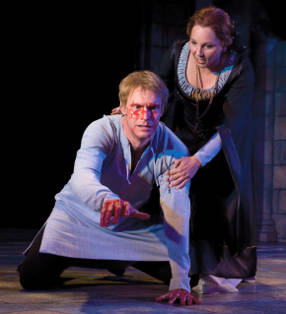
Hanreddy moves the production toward its conclusion with the 4.2 murder of Lady Macduff and her family - her pregnancy bump and the stabbing of her son the only remarkable features of a too-perfunctory scene - and Macduff being tested 4.3 by Malcolm, who kneels beside him and lays his hand on the handle of his sword. The production feels disjointed in the final act, the scenes not convincingly flowing together. Mellen's Lady has her big madness scene 5.1, and she is excellent - eerie and frightened, frustrated and horrified - but the sequence does not develop from prior characterization, the Lady alternately vicious and concerned for her husband in previous scenes, so the babbling insanity seems like an acting set-piece without any organic intensity. The night-gowned Mellen ambles slowly down the long stage right staircase, her candle flickering in the darkness, revealing she has hacked off most of her own hair. Mellen's Lady chains herself to a trap door, then repeatedly tries to wash her hands clean, kneeling by the downstage railing and wailing - "out, damn'd spot" - in frustration. After rubbing at the stage floor with the hem of her night dress, her sobs become a scream, and she falls prone before lapsing into a fetal position.
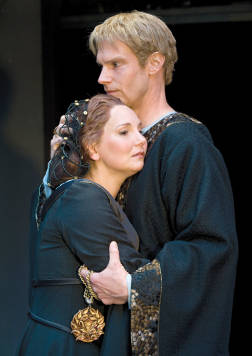
Macbeth's sudden brave resolve also seems to have emerged from nowhere, with his sanity fractured and nerves completely shot in previous scenes. In 5.3, to the pound of drums, he puts on his crown and draws his knife, dark circles visible around his eyes. After Malcolm's soldiers take the red branches from stage left to simulate in 5.4 the movement of Birnam Wood, the Lady screams offstage and a soldier brings her lifeless body to Macbeth. Mellen's Lady lolls backward at Macbeth's words - "signifying nothing" - and drum beats again echo throughout the theatre. Goodman's Macbeth chains himself to his throne as Macduff appears at the top of the stairs - "hell hound!" - and after three stabbing blows, Macduff propels Goodman's Macbeth backward into the throne with a fatal fourth strike.
Hanreddy's production concludes as Macduff pulls the crown free and gives it to Malcolm amid choir-like musical sound effects, and the victorious thanes gather and stand, now as earls. The conclusion is adequately dramatic but feels somewhat too much by-the-book, a bit of a disappointment after an intensely emotional beginning.